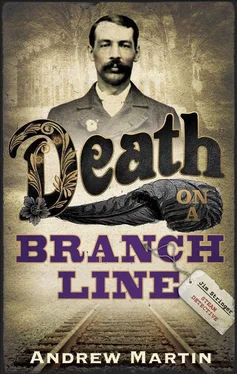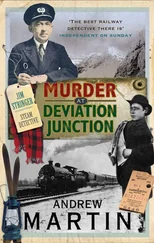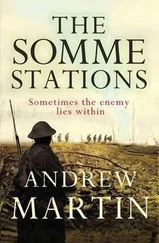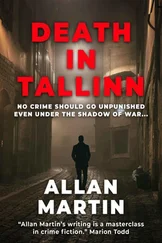Andrew Martin - Death on a Branch line
Здесь есть возможность читать онлайн «Andrew Martin - Death on a Branch line» весь текст электронной книги совершенно бесплатно (целиком полную версию без сокращений). В некоторых случаях можно слушать аудио, скачать через торрент в формате fb2 и присутствует краткое содержание. Жанр: Классический детектив, на английском языке. Описание произведения, (предисловие) а так же отзывы посетителей доступны на портале библиотеки ЛибКат.
- Название:Death on a Branch line
- Автор:
- Жанр:
- Год:неизвестен
- ISBN:нет данных
- Рейтинг книги:5 / 5. Голосов: 1
-
Избранное:Добавить в избранное
- Отзывы:
-
Ваша оценка:
- 100
- 1
- 2
- 3
- 4
- 5
Death on a Branch line: краткое содержание, описание и аннотация
Предлагаем к чтению аннотацию, описание, краткое содержание или предисловие (зависит от того, что написал сам автор книги «Death on a Branch line»). Если вы не нашли необходимую информацию о книге — напишите в комментариях, мы постараемся отыскать её.
Death on a Branch line — читать онлайн бесплатно полную книгу (весь текст) целиком
Ниже представлен текст книги, разбитый по страницам. Система сохранения места последней прочитанной страницы, позволяет с удобством читать онлайн бесплатно книгу «Death on a Branch line», без необходимости каждый раз заново искать на чём Вы остановились. Поставьте закладку, и сможете в любой момент перейти на страницу, на которой закончили чтение.
Интервал:
Закладка:
Andrew Martin
Death on a Branch line
PART ONE
Chapter One
‘Palace Hotel,’ said the voice from Scarborough.
‘Have you any rooms for tonight and tomorrow?’ I asked.
‘Sorry, sir,’ said the voice, ‘but we’re quite full up.’
‘Any good?’ asked Wright, and he propped open the police office door to let in fresh air, or what passed for it in York station.
I put the receiver back on its cradle and shook my head.
‘Pity,’ said Wright. ‘It’s a good one is that. Bang on the front.’
Old man Wright, the police office clerk, already had his weekend by the sea booked so he’d been pretty cheerful all that Friday — and pretty annoying with it. Just now, we were the only two in the office and he was giving me the benefit of his full attention. He stepped forward to wind the handle again.
‘How about trying the Grand?’ he said.
‘I can’t run to that,’ I said.
‘Eh?’ he said, for he was connected to the station operator again, and had only one ear cocked in my direction.
The office clock said three twenty-two. I still hadn’t eaten my dinner, and it sat on the desk in front of me: bread and cheese and a bottle of warmish tea — an engineman’s snap.
By propping open the door, Wright had only changed the quality of the stifling heat, not reduced it. It now came with a smoke smell and a rising roar. On some distant platform, a porter or guard was shouting ‘This is York!’ as if he’d only just discovered the fact.
‘Scarborough Grand, please,’ Wright said to the operator and then, turning to me: ‘Whatever price they quote you, just say, “I’ll pay half.”’
‘Come off it.’
‘It’s what’s expected,’ said Wright, as he handed me the receiver once again, saying, ‘You’re connected.’
He then stood back with folded arms to watch.
‘Is that Scarborough Grand?’ I said into the receiver.
‘I’ve just told you it is,’ said a man.
‘It’s a different person speaking now,’ I said.
‘Must I repeat everything I’ve already said?’ asked the man in a peevish tone.
‘I don’t know,’ I said, ‘since I didn’t hear it.’
Some muttering from down the line, which I broke in on with: ‘This is Detective Sergeant Stringer of the York Railway Police,’ for that would put some folk on their mettle. But this fellow just gave a sigh.
I asked him: ‘Do you have any rooms for over the week-end?’
‘For how many people?’
‘Two.’
‘Double bed?’
‘Aye.’
The line went half-dead. It was like suddenly going deaf. Looking through the door I could see clear across Platform Four to where a little saddle-tank engine had rolled into view.
‘What’s going off?’ asked Wright, who was forever nosing into other blokes’ business in a way that would have been somehow more tolerable if he’d been a younger man.
‘Fellow’s hunting up a double room for me,’ I said.
I knew very well that the man at the Grand would only be looking in a ledger, but I pictured him (a small, bald man in my mind’s eye) wiping the sweat off his brow as he climbed the mighty staircases of the great hotel in search of an unoccupied room. He’d be a little bloke in a stand-up cellulose collar that chafed at his neck, and all the well-spoken chatter and swanky clothes of the guests would make him furious.
Cradling the receiver between neck and chin, I took off my suit coat and hung it over the back of the chair. Then I looked again through the door. On the footplate of the tank engine there was no driver but just a pawky-looking kid, going ten-to-the-dozen with his coal shovel. I thought: What’s that daft little bugger about? He’s over-stoking; the engine’ll blow off in a minute if he doesn’t look out. Of course it just would happen that, at the very instant the man at the Scarborough Grand came back to the telephone, the safety valves on the tank engine lifted and the excess steam began screaming through them.
‘Hello?’ I bawled down the line to the man at the Scarborough Grand. ‘Could you just hold on a tick?’
Wright was pacing about the office, shaking his head.
The kid on the footplate had finally left off shovelling and was climbing carefully down from the engine looking guiltily to left and right as he did so. I thought for a minute he was going to run away from it, for it was bad practice to make an engine blow off, what with all the wastage of water and steam and the horrible racket.
‘Hello there?’ I yelled again into the receiver.
I motioned to Wright to shut the police office door, but before he could do so, the stream of din ended, at which precise moment I heard the click of the line to Scarborough going dead.
‘What happened?’ said Wright as I replaced the receiver.
‘Bloke hung up,’ I said.
‘Pity is that,’ said Wright, who was pulling at his collar to ventilate his scrawny self.
I glanced down at the black steel box that supported the receiver and its cradle — it always put me in mind of a little tomb, somehow.
‘You should try again,’ said Wright, from behind the pages of the Yorkshire Evening Press, for he was now back at his desk and looking over the pages of that paper. ‘Every room at the Grand boasts a sea view, you know. Why have you left it so late, any road?’
‘Just… forgot,’ I said.
‘You’ll be in lumber with your missus over that,’ he said from behind the paper. ‘Likes flower gardens, doesn’t she, your missus?’
The heading on the back page of Wright’s paper was ‘The Crisis At Hand’.
Wright put down the paper.
‘The blooms in the Valley Gardens’ll be absolutely glorious at this time of year — absolutely bloody glorious.’
Wright stood up, pitched the Press across his desk and quit the office, leaving the door open behind him, having no doubt thought of another way of avoiding doing any work. I read the heading now uppermost on the Press: ‘The German Move in Morocco’.
It was holiday time, but all the papers were full of war talk.
I was now alone in the police office, and I watched through the door as the saddle-tank engine moved away. I then looked around the green walls — at the Chief’s half-a-dozen shields won for shooting that rested on the mantel-shelf. (There was no railway police team as such, so the Chief shot for the Wagon Works.) I glanced at the photograph of Constables Whittaker and Ward competing in the tug-of-war at the North Eastern Railway Police Southern Division Athletics, which had been held at Doncaster racecourse in pelting rain two years since. The picture showed them in the process of losing at tug-of-war, but nobody was to know that since the other team was cut out of the picture.
Then there was the photograph by the armoury cupboard, which showed some big men in shorts making a pyramid by standing on each other’s shoulders and supporting, at the very pinnacle, a slightly smaller man. These men were soldiers, and this pyramid was an achievement of the Chief’s days in the York and Lancashire Regiment, which was not named after York, the city in whose railway station I presently sat, but after the Duke of York, whose lands were somewhere else altogether — although still within Yorkshire, of course. The Chief had been a sergeant major, and mad keen on fitness.
I looked at the dead dust of the fireplace: a poker lay in it, left over from the last time the fire had been stirred. That was three months since. It was said that the temperature had lately touched 99 degrees in the shade in London, and an artist at the Press had taken to drawing a fat, sweating face in the middle of the flaming sun that appeared above the weather bulletin.
Читать дальшеИнтервал:
Закладка:
Похожие книги на «Death on a Branch line»
Представляем Вашему вниманию похожие книги на «Death on a Branch line» списком для выбора. Мы отобрали схожую по названию и смыслу литературу в надежде предоставить читателям больше вариантов отыскать новые, интересные, ещё непрочитанные произведения.
Обсуждение, отзывы о книге «Death on a Branch line» и просто собственные мнения читателей. Оставьте ваши комментарии, напишите, что Вы думаете о произведении, его смысле или главных героях. Укажите что конкретно понравилось, а что нет, и почему Вы так считаете.











